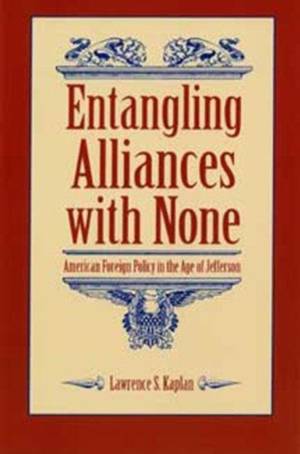
- Afhalen na 1 uur in een winkel met voorraad
- Gratis thuislevering in België vanaf € 30
- Ruim aanbod met 7 miljoen producten
- Afhalen na 1 uur in een winkel met voorraad
- Gratis thuislevering in België vanaf € 30
- Ruim aanbod met 7 miljoen producten
Zoeken
Entangling Alliances with None
American Foreign Policy in the Age of Jefferson
Lawrence S Kaplan
Paperback | Engels
€ 39,95
+ 79 punten
Omschrijving
Written over a thirty-year period, the essays included in this volume develop one central theme: the completion of American isolationism in the formative years of the nation. Isolationism, in Kaplan's view, is not to be taken as economic or cultural independence but as abstention from political or military obligations to Europe, from alliances or from purposeful entanglement in the European balance of power. This study focuses on the assertion that Thomas Jefferson was central to the making of American foreign policy from the Revolution to 1803. But Kaplan's view is not always supportive of Jefferson. In fact, Kaplan believes the collection has a "Hamiltonian flavor," although he does not necessarily consider himself a Hamiltonian either. Kaplan is critical of Jefferson and points clearly to the error of his belief that France could be a counterweight to British power. In the short run Hamilton appears more realistic, but in the long run Jefferson's vision for the country proved wiser and sounder.
Specificaties
Betrokkenen
- Auteur(s):
- Uitgeverij:
Inhoud
- Aantal bladzijden:
- 248
- Taal:
- Engels
Eigenschappen
- Productcode (EAN):
- 9780873383479
- Verschijningsdatum:
- 1/04/1987
- Uitvoering:
- Paperback
- Formaat:
- Trade paperback (VS)
- Afmetingen:
- 152 mm x 229 mm
- Gewicht:
- 425 g

Alleen bij Standaard Boekhandel
+ 79 punten op je klantenkaart van Standaard Boekhandel
Beoordelingen
We publiceren alleen reviews die voldoen aan de voorwaarden voor reviews. Bekijk onze voorwaarden voor reviews.











